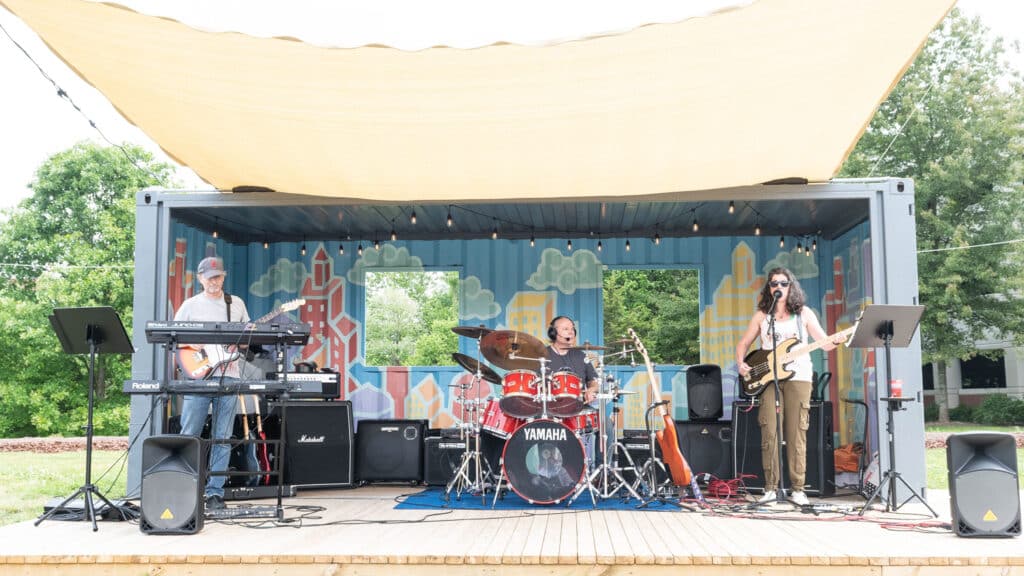Katherine Annett-Hitchcock Plans to Stay Active and Involved After Retiring from the Wilson College

By Raymond Jones
Professor Katherine Annett-Hitchcock developed an interest in the specialty field of “inclusive apparel” while working on her Ph.D. at Virginia Tech. She was living off-campus at the time, in a house whose owner had contracted polio earlier in life.
Confined at times to a wheelchair, her landlady was having trouble finding clothing well-suited to her needs. After discovering that Annett-Hitchcock was a capable seamstress as well as a scholar, the landlady asked her to fashion some clothing better tailored to her circumstances.
Annett-Hitchcock says that’s when she really started to become aware of the differences – sometimes subtle, sometimes not – between off-the-rack and custom-made clothing. A born problem-solver, she immediately began looking for ways to use apparel in ways that could be life-changing as well as functional.
Known as a passionate problem-solver
This passion for problem-solving has always distinguished Annett-Hitchcock as a faculty member at the Wilson College of Textiles. Although she retired at the end of June, she doesn’t plan to walk away cold turkey from her position in the Department of Textile and Apparel Technology and Management. In fact, she hopes to stay involved with NC State University by teaching a few classes online.
Another thing she’s looking forward to is having more opportunities to visit family in the United Kingdom. Having grown up in England, Annett-Hitchcock received her first academic degree at the University of Manchester.

Annett-Hitchcock’s friends know she’s a woman with diverse interests. At the undergraduate level she studied art history. Later, while working on her master’s degree at Michigan State University, she was eyeing a career in museum collections management.
That focus on museum work, however, shifted after she was assigned to an assistantship in the university’s costume shop. Her capabilities there were such that at one point she designed and stitched all the costumes needed for a complete production of “Charley’s Aunt.”
Her exposure to so many different fabrics and body shapes in the costume shop sparked a decision to pursue the Ph.D. in clothing and textiles at Virginia Tech.
Always a prolific writer
Annett-Hitchcock has always been a prolific contributor to professional journals. An even bigger milestone lies ahead this fall when Bloomsbury Academic publishes her first book, “The Intersection of Fashion and Disability: A Historical Analysis.” It will be available online in October, followed by a hardcover release in November.
To continue the public discussion that she hopes will be generated by her book, she’ll also be curating a website called DisabilityFashionHistory.com.
Inclusive design is a lesser-known specialty
Annett-Hitchcock says the specialty of inclusive design is not as well-practiced as others within the world of fashion. Nonetheless, interest in the field has grown substantially in recent years. Accordingly, major retailers such as Target, Tommy Hilfiger and Zappos are routinely carrying clothing for consumers who have a wide array of physical abilities.
Annett-Hitchcock first cultivated her interest in inclusive apparel by taking a course in barrier-free design at Virginia Tech. She came away from that course impressed by the number of accommodations that had been developed in what she calls “the built environment.”
Inspired by companies that work to reduce barriers
For example, she discovered that companies like Bosch, General Electric Co. and Kohler had collaborated to design a variety of kitchens for people with differing physical abilities.
These were on display in the Center for Real Life Design, which at the time was associated with her own academic department.
Helping women with physical limitations
A powerful thought that occurred to her at the time was: “Why can’t we be ‘barrier-free’ when it comes to clothing? After all, our ‘clothing environment’ involves direct skin contact all day long.” Annett-Hitchcock went on to complete her doctoral dissertation on the topic of designing professional clothing for women with physical limitations. She was driven by a desire to increase both functionality and professional appearance simultaneously.
As an example, polyester is a fiber that can be used to make luxurious-feeling clothing, but slick material might also cause people to slide right out of their seats. In addition, fleece fabrics that offer the comfort of sweatpants seldom provide the “look” that is needed in professional settings.
Annett-Hitchcock has drawn inspiration from Maura Horton, a fashion designer well known in the field of adaptive clothing design.
Horton got her start by designing shirts with magnetized buttons for her husband, football coach Don Horton, who lost his dexterity due to early-onset Parkinson’s disease. Horton, now deceased, coached at NC State during the Russell Wilson era.
Horton’s company, MagnaReady, is now one of the nation’s leading manufacturers of adaptive clothing.
A skilled singer and instrumentalist
In addition to her expertise in apparel design, Annett-Hitchcock is a skilled musician who performs with a multi-talented assemblage of NC State faculty who refer to their group as the Quadrivium Project. She knows how to play mandolin, guitar and bass, though her main role is vocalist.
“We cover a lot of English rock bands,” she says, “such as Led Zeppelin and Genesis.”

The band has even played a Woodstock remembrance concert at Lincoln Theater in Raleigh.
Annett-Hitchcock has no personal memories of Woodstock; at the time of the original concert, she was only three years old.
Nonetheless, her late father was a Woodstock-era music enthusiast, and she grew up enjoying the melodies of Crosby, Stills, Nash and Young, along with others who made Woodstock such an enduring cultural phenomenon.
The Wilson College has huge cachet
One thing for certain, following retirement, is how much she’ll miss the “wonderful colleagues and wonderfully creative students” whose company she enjoyed each day for so many years.
“I couldn’t have asked for a better place to teach,” she says. “When you tell people you work at the Wilson College, their eyes light up. This place has huge cachet, not only in this country but around the world.”
- Categories:


